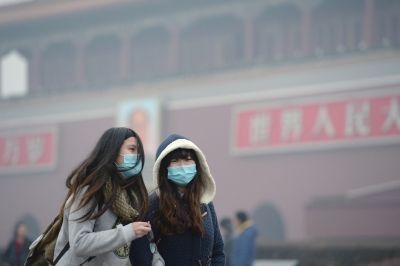Beijing's PM2.5 density drops significantly
 0 Comment(s)
0 Comment(s) Print
Print E-mail Xinhua, April 24, 2015
E-mail Xinhua, April 24, 2015
Beijing's average PM2.5 density dropped significantly in Q1, thanks to the capital's continuous air pollution control efforts and favorable weather conditions during this period.
 |
|
Two women?wearing mask at Tian'anmen square in Beijing. [File photo] |
The average density of PM2.5 (airborne particles smaller than 2.5 microns in diameter) dropped by 19 percent in the first quarter compared with the same period last year, Beijing's environmental protection bureau said this week.
The average densities of PM10, sulfur dioxide and nitrogen dioxide also dropped by 8.8 percent, 42.9 percent and 11.4 percent respectively in Beijing.
Chen Tian, head of the Beijing Environmental Protection Bureau, attributed the remarkable air quality improvement to the reduction of coal burning, a drop in construction activities and good air conditions to disperse pollutants.
Last year, Beijing realized a record high of 2.8 million-tonne cut in coal use. In March, two sets of coal-burning power generation facilities of two plants were shut down in Beijing.
The capital will continue to improve its energy structure to keep coal consumption under 15 million tonnes, phase out another 200,000 vehicles and close more than 300 polluting factories this year.
Beijing has 5.5 million registered vehicles, which discharge 700,000 tonnes of pollutants a year.
"We will accelerate promotion of new energy cars to control emissions of vehicles," said Li Kunsheng, an official of the bureau.
Policies about the fees over traffic jamming or fuel burning and dust at construction sites will be adopted, according to Zhang Gong, vice mayor of Beijing.
Meanwhile, the air quality in nearby Tianjin municipality and Hebei province also improved in the first quarter.
The PM2.5 density dropped 15 percent in Tianjin and 25 percent in Hebei province respectively year-on-year in the first quarter.
As one of the country's most polluted regions, Beijing and the neighboring Tianjin municipality and Hebei province have been working together to fight air pollution in recent years. The region has been ordered by the central government to cut PM2.5 from 2012 levels by 25 percent by 2017.





